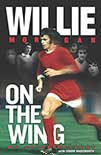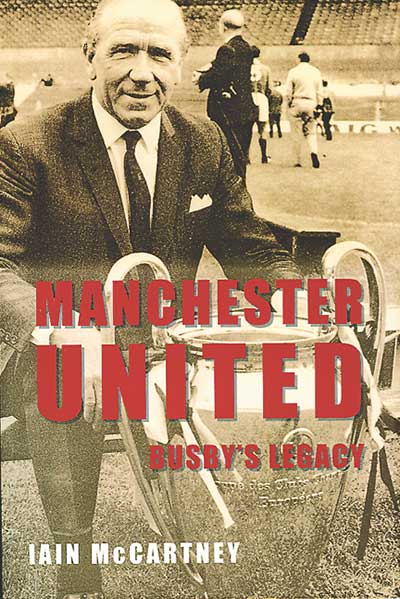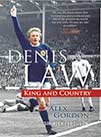 by Willie Morgan with Simon Wadsworth
by Willie Morgan with Simon Wadsworth
Trinity Mirror, £16.99
Reviewed by Graham McColl
From WSC 326 April 2014
Buy this book
If the purpose of this book were to rid Willie Morgan of the image of being George Best’s doppelganger, it sets about it in a strange fashion. Behind the main picture on the cover, faint background images show Morgan at various stages of his life from babe to footballer but, inexplicably, the only other person amid these images is Best, Morgan’s late 1960s and early 1970s fellow winger at Manchester United. On the inside back flap, there is a picture of Morgan in a United strip… along with Best. Inside the book there is only one advertisement for another publication – a page-sized promotion for The Best of Best, a “souvenir magazine” from the Daily Mirror that boasts “lost images” of “The Genius As You’ve Never Seen Him Before”.
George is given further prominence once the story begins, receiving a mention on more than 40 pages. Yet in Bestie, George’s own 1998 authorised biography, Morgan features only twice, both times derogatorily. “Morgan always seemed a bit jealous,” Georgie says. Morgan, in contrast, on first mention of Best, says, touchingly, that their lives would be “intertwined”.
Pushing this book on the back of Best, as someone has decided to do, is unnecessary. Morgan is an engaging storyteller, a happy-go-lucky individual with an underlying toughness forged, as he relates in excellent detail, through his upbringing in Sauchie, the Clackmannanshire mining village. He is also capable of some fabulous self-promotion: “Along with Geroge Best [who else?], I was one of the two biggest stars in football,” he says of mid-1968 – the era of Eusébio, Bobby Charlton, Bobby Moore, Jimmy Johnstone, Pelé, Denis Law et al.
One early inconsistency almost brings the tale to a shuddering halt, though. Willie states that his dad, after a theological dispute with a Canon Matthews in Sauchie when Willie was around 12, had “wanted to kill” Matthews, and never went to church again. Yet, when Willie turns 15, his dad keeps him on at school, on the advice of a priest, rather than sending him down the pit, because: “My dad was never one to go against the wishes of the church.” This seeming inconsistency is more than a pedantic niggle. If Willie goes down the mine, he doesn’t play schools football, doesn’t get spotted by Burnley FC, doesn’t become a pro footballer, doesn’t write this book.
Get over that hurdle and the book lives up to the breathless cover blurb of “hundreds of tales” about “the hell-raising Best [him again] and a host of others”, although the story of Scotland’s 1974 World Cup is shockingly light on insider detail. Things peter out with post-playing tales of socialising with people such as Rod Stewart which does at least bring some amusement, with a schoolboyishly eager Stewart asking Willie, as they attend a match, to relate each stage of his own pre-match professional routine. “I would probably be picking some horses out right now for the next race,” Morgan replies. His yarn is like that all the way through and plentifully enjoyable for it.
Buy this book
 by Iain McCartney
by Iain McCartney by Willie Morgan with Simon Wadsworth
by Willie Morgan with Simon Wadsworth King and country
King and country